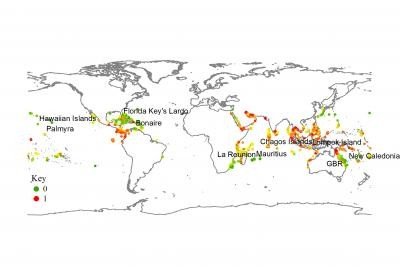A map of the world’s corals and their exposure to stress factors. The exposure index ranges from 0-1, with green indicating sites with a low exposure index (most likely to benefit from management), and red indicating sites with a high exposure index (less likely to benefit from management). Credit: Wildlife Conservation Society.
NEW YORK, Aug. 11 (UPI) -- U.S. researchers at the Wildlife Conservation Society and other groups say they've created a map of the world's coral reefs charting climate stress impacts.
The map identifies world reef systems at risk from high seawater temperatures, ultra-violet radiation, weather systems and sedimentation, a WCS release said Thursday.
The map by U.S., European and Australian marine researchers aims to identify reef systems where biodiversity is high and stress is low, ecosystems where management has the best chance of success, the WCS said.
"Coral reefs around the globe are under pressure from a variety of factors such as higher temperatures, sedimentation, and human-related activities such as fishing and coastal development," WCS conservationist Joseph M. Maina said. "The key to effectively identifying where conservation efforts are most likely to succeed is finding reefs where high biodiversity and low stress intersect."
The map shows coral regions in Southeast Asia, Micronesia, the Eastern Pacific, and the central Indian Ocean as being at greater risk, while the Caribbean, Great Barrier Reef, Central Pacific, Polynesia, and the Western Indian Ocean are under less stress.
"The study provides marine park and ecosystem managers with a plan for spatially managing the effectiveness of conservation and sustainability," Caleb McClennen, director of the WCS Marine Program, said. "The information will help formulate more effective strategies to protect corals from climate change and lead to improved management of reef systems globally."















